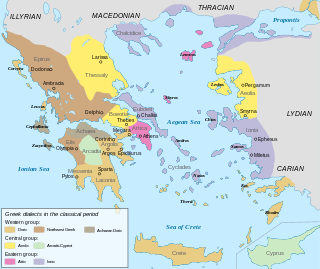See also
- Dorian (disambiguation), a synonym
Doric may refer to:

The Dorians were one of the four major ethnic groups into which the Hellenes of Classical Greece divided themselves. They are almost always referred to as just "the Dorians", as they are called in the earliest literary mention of them in the Odyssey, where they already can be found inhabiting the island of Crete.
Ionic or Ionian may refer to:

Doric, the popular name for Mid Northern Scots or Northeast Scots, refers to the Scots language as spoken in the northeast of Scotland. There is an extensive body of literature, mostly poetry, ballads, and songs, written in Doric. In some literary works, Doric is used as the language of conversation while the rest of the work is in Lallans Scots or British English. A number of 20th and 21st century poets have written poetry in the Doric dialect.

Attic Greek is the Greek dialect of the ancient region of Attica, including the polis of Athens. Often called classical Greek, it was the prestige dialect of the Greek world for centuries and remains the standard form of the language that is taught to students of ancient Greek. As the basis of the Hellenistic Koine, it is the most similar of the ancient dialects to later Greek. Attic is traditionally classified as a member or sister dialect of the Ionic branch.

Doric or Dorian, also known as West Greek, was a group of Ancient Greek dialects; its varieties are divided into the Doric proper and Northwest Doric subgroups. Doric was spoken in a vast area, including northern Greece, most of the Peloponnese, the southern Aegean, as well as the colonies of some of those regions in Cyrene, Magna Graecia, the Black Sea, the Ionian Sea and the Adriatic Sea. It was also spoken in the Greek sanctuaries of Dodona, Delphi, and Olympia, as well as at the four Panhellenic festivals; the Isthmian, Nemean, Pythian, and Olympic Games.

Ionic or Ionian Greek was a subdialect of the Eastern or Attic–Ionic dialect group of Ancient Greek. The Ionic group traditionally comprises three dialectal varieties that were spoken in Euboea, the northern Cyclades, and from c. 1000 BC onward in Asiatic Ionia, where Ionian colonists from Athens founded their cities. Ionic was the base of several literary language forms of the Archaic and Classical periods, both in poetry and prose. The works of Homer and Hesiod are among the most popular poetic works that were written in a literary form of the Ionic dialect, known as Epic or Homeric Greek. The oldest Greek prose, including that of Heraclitus, Herodotus, Democritus, and Hippocrates, was also written in Ionic. By the end of the 5th century BC, Ionic was supplanted by Attic, which had become the dominant dialect of the Greek world.

Ancient Greek includes the forms of the Greek language used in ancient Greece and the ancient world from around 1500 BC to 300 BC. It is often roughly divided into the following periods: Mycenaean Greek, Dark Ages, the Archaic or Epic period, and the Classical period.

In linguistics, Aeolic Greek, also known as Aeolian, Lesbian or Lesbic dialect, is the set of dialects of Ancient Greek spoken mainly in Boeotia; in Thessaly; in the Aegean island of Lesbos; and in the Greek colonies of Aeolis in Anatolia and adjoining islands.
Dorian mode or Doric mode can refer to three very different but interrelated subjects: one of the Ancient Greek harmoniai ; one of the medieval musical modes; or—most commonly—one of the modern modal diatonic scales, corresponding to the piano keyboard's white notes from D to D, or any transposition of itself.
Aeolian commonly refers to things related to either of two Greek mythological figures:
Homeric is an adjective meaning of, relating to, or characteristic of Homer.

The Dorian invasion is a concept devised by historians of Ancient Greece to explain the replacement of pre-classical dialects and traditions in Southern Greece by the ones that prevailed in Classical Greece. The latter were named "Dorian" by the ancient Greek writers, after the Dorians, the historical population that spoke them.
Arcadian may refer to:
The Pella curse tablet is a text written in a distinct Doric Greek idiom, found in Pella, the ancient capital of Macedon, in 1986. Ιt contains a curse or magic spell inscribed on a lead scroll, dated to the first half of the 4th century BC. It is held in the Archaeological Museum of Pella. It was published in the Hellenic Dialectology Journal in 1993. The Pella curse tablet exhibits some of the typical Northwest Greek features, as well as a cluster of unique Doric features that do not appear in other subdialects of this family. It represents the same or a very similar vernacular dialect that is also attested in the other Doric inscriptions from Macedonia. This indicates that a Doric Greek dialect was not imported, but proper to Macedon. As a result, the Pella curse tablet has been forwarded as an argument that the Ancient Macedonian language was a dialect of Northwest Greek, and one of the Doric dialects.

Ancient Greek in classical antiquity, before the development of the common Koine Greek of the Hellenistic period, was divided into several varieties.
Doric dialect may refer to:
Doric language may refer to:
Dorian may refer to:
Several vessels have been named SS Doric. You may be looking for: